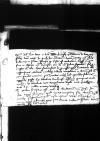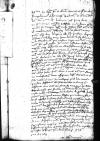⌊⌋ Vestrae Reverendissimae Dominationis ⌊Lubaviae⌋ 18 huius datae, 21 prima eiusdem mensis redditae, mihi fuere gratae, quidem eo maxime, quod mihi testatae sunt Vestrae Reverendissimae Dominationis incolumitatem ipsamque laetam ac sanam vivere. Quam Dominus Deus longaevo sibi praestare dignetur, obsecro.
Tabellio meus hinc ⌊Vilnam⌋ versus solvit VI-a Mathiae, cum quo et sacrae ⌊regiae maiestati⌋ non incognitum feci, quod passim ⌊hic⌋ inter nostrates deferuntur, rogans atque obsecrans, ne illis susurrionibus, si tale quid ad pientissimas aures maiestatis suae perlatum fuerit, nobis non auditis fidem praebeat. Satis id extense ⌊suae maiestati⌋ declaravi et tale simile quid biennio effluxo factum esse in memoriam suae maiestati reduxi extensissime et profusissime etc.
In negotio
illustrissimi
⌊comitis palatini⌋ quid ⌊dux vicinus noster⌋ Vestrae Reverendissimae Dominationi responderit, aveo scire, quantum fas est, quod indiem exspecto.
In novis etiam nil aliud habeo, quam dominus ⌊dominus a Verden⌋ Vestrae Reverendissimae Dominationi innotuit in molestatione mea. Assignavi legem illam Vestrae Revrerendissimae Dominationi solum, utrum eam etiam ita intelligeret, quid latro meretur, qui sine diffidatione dominum suum invadat et adversus eum conspiret, an etiam ita plectendus venit, prout lex dictat de censu, qui spectat ad vicarium, ipse enim coram iusto iudice eum bene tuebitur, ille prodit, habebat panem, quem apud amicos sumpsit, qui verbotenus solum ita se appellant, in factis sunt enim aemuli et pestilentes persecutores in stomacho inconsumpti, cum insidiatus fuerat mihi, quomodo Deus prosperabit facta nostra, ex quo tam intestino malo nos invicem
persequuntur, non video. Ego autem sileo et defensioni illius me subicio, qui etiam patrem pro persecutoribus suis novit exorare. De his extensius et tutius coram commentabi[mus]
Reverendissimi domini ⌊episcopi⌋ litteras Gnesnensis alia via, ne gravarem Dominationi Vestrae Reverendissimae, disposui. <S>chedam, qua hoc superioribus litteris significavi, neglexi intrudere praefatis litteris.
Vestram Reverendissimam Dominationem vigentem et valere, et vivere felicibus saeculis cupiens.
Reverendissime Domine.
Hac hora a domino ⌊Alberto Kiewski⌋ ex ⌊Cracovia⌋ de
dato
VII Februarii litteras accepi, in quibus haec continentur. Rerum novarum non alias habemus in praesentia, praeterquam quod ⌊caesar⌋ est ⌊Mediolani⌋, classem, cum qua fuit in ⌊Africa⌋, non dimisit, cui tamen non solvit stipendium, sed promssis eam alit. Vere futuro forte de promissis ipsis licitatione illi responsuros. Meditatur multorum iudicio irruptionem in ⌊Graeciam⌋, sed eam rem pandit nemini, quo ⌊Turchas⌋ nihil tale opinantes felicius aggredi posset. Ex contributo Siciliensium conflavit quinquies centum milia, ex contributo vero Neapolitano duplum eius. Intelligat autem Dominatio Vestra millia aureorum utrobique.
Haec <s>cheda scripta est ad dominum ⌊Tidemannum Gise⌋. Item de ⌊rege Sueciae⌋,
quod
interemptus sit, certum esse mihi significatum est, quae res nonnihil novitatis adversus nos parituram videtur, praesertim ⌊vicinum nostrum⌋. Dii bene vertant.


